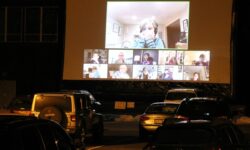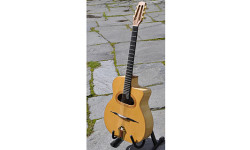By Alex Oliveira
Hometown Weekly Reporter
Aiden Collins, an eighth grader at the Dover-Sherborn Middle School, has strummed new life into the school’s music program by hand making five electric basses for the school’s general music program taught by Tom Duprey.
Duprey isn’t directing your ordinary middle school jazz band: there are no rows of folding chairs or black aluminum music stands, and the kids aren’t fidgeting at attention until their cue comes. Rather than channeling the big bands of Glenn Miller and Benny Goodman, Duprey teaches his students to make music in a form they recognize: through rock bands. With a classic, two-guitar-bass-and-drum format, the middle school students learn the essentials of blues progressions through rock and roll staples like “Hound Dog” and “Twist and Shout,” then write their own songs to perform at the end of the term.
The program has been developing for about eight years now – keyboards were added to the mix of six string guitars, and improvised percussion pieces were replaced with electric drum kits.
But one crucial item remained glaringly missing: bass guitars.
“We never had basses. The students would play the regular guitar like bass,” said Duprey. “The curriculum is still developing and we were going to see about purchasing basses, but then I heard that Aiden had built and donated a bass to the Pine Hill School. The band director there said: ‘Tom, this is a great bass, this kid does good work.’ So I thought, ‘Hey, I wonder if Aiden would build five basses for us?’”

Step one in the process, Aiden cut this telecaster bass from a piece of alder with a hand saw. Photos by Alex Oliveira
He started by ordering kits that come with all the pieces needed to build a bass: a body and neck, tuners, pickups, tone knobs, and all the internal electronics necessary to make those components sing. After he’d built a few, Aiden decided to give one away to the Pine Hill School’s music program. “I thought it would be great to have people learning to play on my basses.”
A day after Aiden gave the instrument to Pine Hill, Duprey was reaching out to him with a plan.
“Tom reached out the day after and said, ‘I think this room could use some basses.’ And I was like, ‘I’m down.’”

One of the five basses Aiden Collins assembled by hand for the Dover-Sherborn Middle School. Photos by Alex Oliveira
“He worked nonstop once he got them,” Aiden’s father, Pat Collins, said. “He went pretty much around the clock to get them done in about two or three weeks.”
The results, as Duprey put it, “Were just the greatest thing.”
And they really are.
Modelled after a Hofner bass (the kind Paul McCartney played when he first showed up on the Ed Sullivan Show stage), the basses' semi-hollow violin shaped bodies, complete with all the pickups, knobs and switches of an authentic Hofner, have been irresistible to the middle school students.
“They’re totally psyched to use those things. They come in and their eyes just light up,” said Duprey, “All the response from everybody has just been like, wow that’s amazing.”
The world’s greatest bass players are known for having enigmatic personalities, and Aiden bears the hallmarks of being a bassist to his soul. Though modest and unassuming when you first shake his hand, Aiden’s choice to wear an electric-blue shirt, seemingly adorned with sunglasses-clad flamingoes, to his middle school winter concert was a quiet, yet telling sign of the wit teeming beneath the surface. Once he was talking about music and basses, though, this wit, and his enthusiasm, passion, and expertise, began to rise rapidly to the surface and pour complexly out of him.
Looking to his parents for a bit of help, Aiden calculated that he’s built at least ten basses since he started, though as he tends to borrow and reuse parts from all of them, his quiver sits in various states of working and hobbled order. Once, too impatient or too excited to get to work on a project, he hand-cut a perfectly rendered Telecaster bass from a hunk of raw alder wood. Take a look at the photos accompanying this article; Aiden is good at his work, and it’s evident.
At fourteen, Aiden Collins is already looking at ways to make a business out of his passion. Though an experience trying to sell one of his basses at Music Go Round in Natick resulted in what Pat Collins referred to as “some lessons in economics,” Aiden’s natural entrepreneurship can be seen in one of his motivations for donating a bass to the Pine Hill School:
“I had done a couple of basses already, and I thought doing one for the elementary school would be a good way for people to see my basses. That’s probably when people are going to get basses, when they’re starting to learn, so they might want to get one from me, eventually.”
Until the day Hofner and Fender are eclipsed by the Collins brand, one thing will always remain a fact: the Dover-Sherborn music program has been enriched for years to come by Aiden’s work. As Tom Duprey put it, “I guess the word would be more authentic. Aiden gave us the final step in authenticating a real band experience.”

























